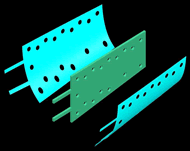|
SPECapcSM
Information
Frequently Asked
Questions
Reasons to Join
the SPECapc Benchmarking Effort
SPECapc
Project Committee Rules
Home |
Overview
SPECapc for Unigraphics V17 was developed by Bob Vowles, a user
with 20 years of experience with the application, and Bob Elliott, senior
system administrator with EDS PLM Solutions. It is written as a series
of UG Macros that run on Windows NT and Windows 2000.
New models include an engine assembly containing more than 400,000 vertices,
and an intake manifold assembly containing more than 200,000 vertices.
Both models are considerably larger than those used in SPECapc for Unigraphics
V15.
Fifty-two (52) subtests are included within SPECapc for Unigraphics V17.
Individual scores are reported for each subtest, both as elapsed time
and as a normalized ratio. The reference system for computing the normalized
ratio is a 700Mhz Pentium III with a 440BX chipset, 512MB PC100 ECC SDRAM,
9GB Quantum Viking Ultra2 SCSI (7200 rpm), and Diamond FireGL1 graphics.
The subtests are categorized into three groups:
- Graphics - assembly, drafting and mechanisms, 10 subtests,
50-percent weighting
- CPU-intensive - 22 subtests, 40-percent weighting
- I/O intensive - 20 subtests, 10-percent weighting
Each major group is assigned a score derived from the unweighted geometric
mean of the normalized scores of each subtest in the group. An overall
composite is derived from the weighted geometric means of the three groups.
|
The Benchmark
 SPECapcSM for Unigraphics V17
SPECapcSM for Unigraphics V17
|



